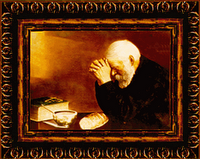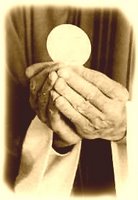Food for Thought 2: Our Daily Bread
Q: Luther’s explanation of the Fourth Petition of the Lord’s Prayer begins, “Daily bread includes everything that has to do with the support and needs of the body.” Some commentaries understand it to mean heavenly bread of communion. Are both views correct?
 A: Many commentators include a spiritual interpretation of the Fourth Petition in their discussion of the Our Father. I don’t object to this being a part of the understanding of this petition. I disagree when they make it the only allowable interpretation, or even the primary meaning.
A: Many commentators include a spiritual interpretation of the Fourth Petition in their discussion of the Our Father. I don’t object to this being a part of the understanding of this petition. I disagree when they make it the only allowable interpretation, or even the primary meaning.Jesus certainly anticipated things prior to accomplishing or instituting them. He taught Nicodemus about baptismal regeneration in John 3 and spoke of eating and drinking His flesh and blood in John 6. Yet the Lord’s Supper was only instituted on the eve of His Passion and Baptism received its mandate after the Resurrection. Likewise, He foretold His coming death several times before it actually happened. So, too, this prayer could be looking forward to the Eucharist.
However, the prayer’s context suggests that we be careful about allegorizing or spiritualizing any of its parts. It sits among words concerning praying, fasting, and almsgiving. Many abused each of these practices and Christ applied His corrective in the Sermon on the Mount. Like fasting and helping the poor, prayers are not to be spectacles. They are simple requests concerning our human needs, for “your Father knows what you need before you ask him. (Matthew 6:8)” These needs are spiritual, mental, and physical — and “daily bread” most simply and directly concerns everything not belonging primarily to the spiritual realm.
 Certainly, the Church has traditionally prayed these words immediately before the Lord’s Supper, as a sort of “table prayer.” The entire prayer must include proper reception of Holy Communion, for the Supper belongs to God’s name, kingdom, and will; it involves physical eating and drinking; it brings forgiveness, guards from evil, and leads us from temptation to God’s truth.
Certainly, the Church has traditionally prayed these words immediately before the Lord’s Supper, as a sort of “table prayer.” The entire prayer must include proper reception of Holy Communion, for the Supper belongs to God’s name, kingdom, and will; it involves physical eating and drinking; it brings forgiveness, guards from evil, and leads us from temptation to God’s truth.Yet to restrict the Fourth Petition to Communion downplays God’s involvement in His physical creation, including the Incarnation of His Son. God created matter, designing us to eat and drink, and He wants us to remember that He is the Source of all earthly support and life as well as the Giver of blessings of new and eternal life.
If anything, the placement of the petition — surrounding the physical, temporal state with the things of the spirit and eternal life — argues for a face-value interpretation. The proportion of earthly requests compared with the spiritual requests runs counter to our own inclinations. Left to our own devices, if we prayed at all we’d probably load up on the specifics of this life, including food, drink, house, home, and health at the expense of submitting ourselves to God’s will, trusting in His grace, and seeking new life here and eternal life in the resurrection.
Allowing the words of the text to speak for themselves acknowledges that we are both flesh and spirit and confesses our need for God to provide every needed blessing of body and soul.
Scripture quoted from The Holy Bible, English Standard Version™, © 2001 by Crossway Bibles.
Send email to Ask the Pastor.
Walter Snyder is the pastor of Holy Cross Lutheran Church, Emma, Missouri and coauthor of the book What Do Lutherans Believe.
Technorati Tags: daily bread | body of Christ | Holy Communion | food | Our Father | Lord’s Prayer | Fourth Petition | Sermon on the Mount

2 Comments:
The problem is the word translated "dayly", which nobody actually knows how to translate. Hieronymos famously translated it different in the two version of the prayer in the gospels. It can be translated dayly, but also "future" in the sense of "heavenly", making the verse: "Give us today the bread of heaven", which would be a reference to the eucharist without being a allegory.
Even "bread of heaven" or "heavenly bread" would seem to speak to the needs of the body, even if there is a eucharistic reference there, too. God provided real physical sustenence for the Israelites in the desert as well as spiritual sustenence in Christ (1 Cor. 10:1-4, etc). He also provides bread from heaven for us today through the vocation of the farmer, seasonable weather, and the like.
Post a Comment
<< Home